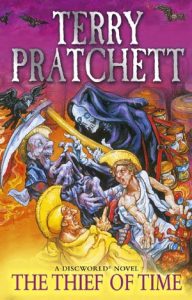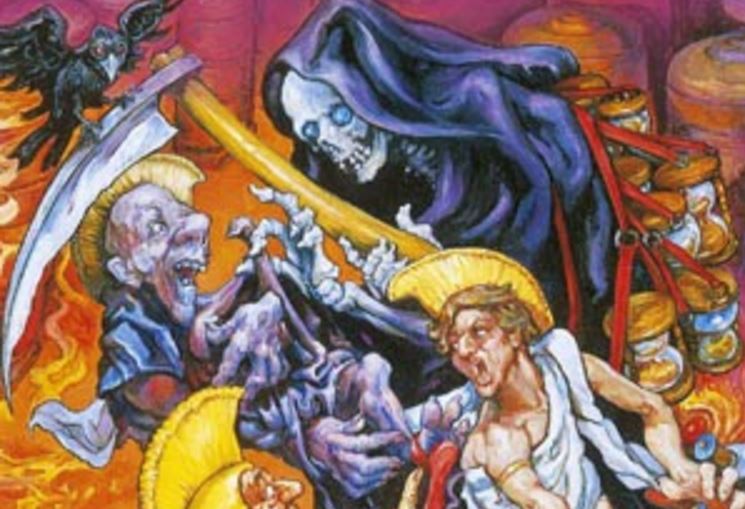 Like its direct predecessor, ‘The Truth’, ‘Thief of Time’ features regularly on a lot of Discworld fan’s favourites list. It is half a part of the Death arc and part totally independent, the monkish main character of Lobsang reminding me a lot of Brutha in ‘Small Gods’, and certainly less focused on Death than some of his other appearances have been. This two book foray away from the main characters is the first in the series since ‘Small Gods’, incidentally, and for the most part it is a successful one.
Like its direct predecessor, ‘The Truth’, ‘Thief of Time’ features regularly on a lot of Discworld fan’s favourites list. It is half a part of the Death arc and part totally independent, the monkish main character of Lobsang reminding me a lot of Brutha in ‘Small Gods’, and certainly less focused on Death than some of his other appearances have been. This two book foray away from the main characters is the first in the series since ‘Small Gods’, incidentally, and for the most part it is a successful one.
I will not, however, say that ‘Thief of Time’ is as strong a novel as ‘The Truth’, at least for me. It is a return to the sometimes overly complicated Death storylines, although I certainly found it easier to follow than I did ‘Soul Music’ or ‘Reaper Man’. Lobsang is a brilliant novice of the History Monks, the tireless crusaders who work to keep time running smoothly. He is paired with the legendary Lu-Tze to stop the building of the Glass Clock, the most accurate clock ever made. This clock has been commissioned by the Auditors, the faceless grey beings who attempt to keep order in the chaos that is Discworld. Death is on his own mission to stop them by getting the gang back together – the Four Horsemen and the elusive fifth member of the group, who left before they got famous. Throw in Susan for good measure and it is not hard to see why so many people adore this book.
The similarities to ‘Small Gods’ does not end here; readers with a sharp memory will remember that Lu-Tze has made an appearance before, in the aforementioned ‘Small Gods’. He was responsible for stopping a war, because he thought that humans had suffered enough for a while. His appearance in the Omnian story, centuries previously, is not a surprise when you learn that Lu-Tze is in fact eight hundred years young. I cannot be sure but I am pretty curtained he has at least been namedropped in other novels too. This is one of my favourite things about the series – that such small, inconsequential characters can appear so spectacularly later on in their own stories. From this source alone, I think Sir Terry would have had the plentiful ammunition to just keep writing and writing, had he wished to. There are so many stories left to tell and you just know he would have known so many of them.
Susan is a welcome addition to this story, someone vaguely sensible in world that tends to forget itself. She is the perfect foil to her grandfather; he cares so much that sometimes he loses his focus on the bigger picture, whereas Susan cares too but in an entirely sensible way. She never forgets what she is doing and drives the story forwards with her practicality. In fact, in this story, a little moment of weakness with a box of chocolates was a nice bit of proof that she is indeed human after all.
Being human, and the nature of humanity, is a big part of this novel and the theme that ties several of the storylines together. The Auditors build a human skin for one of their number to supervise the building of the Glass Clock, and name her Lady LeJean. Lady LeJean soon discovers a truth that Susan explains to Lobsang – that ‘form defines function’. She begins thinking like a human, with all of the internal chaos that form entails, and turns against her own kind to team up with Susan and Lobsang. The other Auditors take to human forms and are picked off one by one. Over on the other side of the story, Death finds his fellow horsemen struggling to pick themselves up and get around the humanity that has been forced upon them by their ‘believers’. It takes the arrival of the Fifth Horseman, Kaos, to give them any chance of defeating the Auditors. Death himself has a wonderful, human moment of self-delusion when he notes to himself that he is lucky he has remained unchanged. The Death of ‘Mort’ would barely recognise the ‘man’ he has become.
The story also features a great cameo by Nanny Ogg, the midwife who delivers Lobsang and his ‘twin’. It is strange to see Nanny independent of her witching cohort, but not unwelcome. She is a much more solemn character when she isn’t with Granny Weatherwax, one who lends real weight to the seriousness of a situation, and it is good to see her like that. It reminds you of how much depth she actually possesses.
‘Thief of Time’ is not my favourite novel of the series, but it is also disappointing. It is also in possession of a lovely ending, which does not quite rival the structural powerhouse that is the ending of ‘Interesting Times’, but is close to it. The galaxy of stars that Lobsang creates for Susan is called a ‘perfect moment’ and Sir Terry was not wrong; it is as near to perfect as any Discworld moment that has come before.
Some of the coverage you find on Cultured Vultures contains affiliate links, which provide us with small commissions based on purchases made from visiting our site. We cover gaming news, movie reviews, wrestling and much more.



